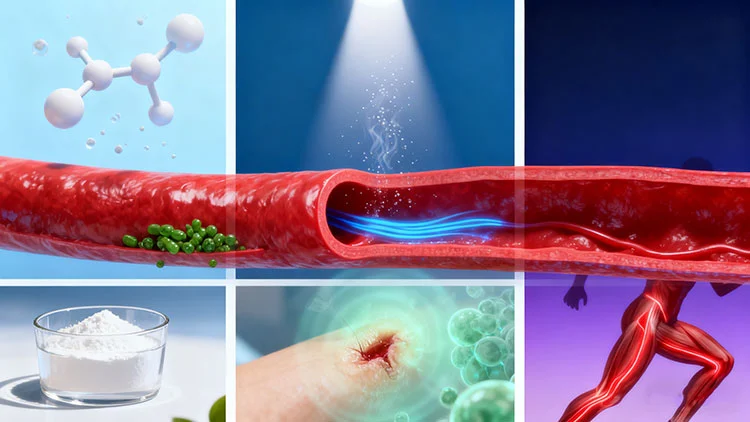Why L-Arginine HCL Powder Is the Game-Changer for Nitric Oxide and Circulation?
L-Arginine HCL Powder has emerged as a revolutionary supplement in the realm of cardiovascular health and athletic performance. This highly bioavailable form of the amino acid L-arginine is transforming the way we approach nitric oxide production and circulatory support. As a critical precursor to nitric oxide, L-Arginine HCL Powder plays a pivotal role in vasodilation, enhancing blood flow throughout the body. This not only supports cardiovascular health but also improves nutrient delivery to muscles, making it a favorite among athletes and fitness enthusiasts. The powder's ability to dissolve easily and its versatility in application have made it a go-to supplement for those looking to optimize their circulatory health naturally. In this blog, we'll explore the science behind L-Arginine HCL Powder's effectiveness and why it's considered a game-changer in the world of nitric oxide boosters and circulation enhancers.
How L-Arginine HCL Powder Activates Nitric Oxide to Enhance Blood Flow
The Biochemical Pathway
L-Arginine HCL Powder serves as a crucial substrate in the production of nitric oxide within the body. When ingested, this highly soluble powder is rapidly absorbed into the bloodstream, where it undergoes a series of biochemical reactions. Enzymes known as nitric oxide synthases (NOS) convert L-arginine into nitric oxide and citrulline. This process is fundamental to the vasodilatory effects observed with L-Arginine HCL Powder supplementation. The resulting increase in nitric oxide levels leads to relaxation of the smooth muscles lining blood vessels, effectively widening them and improving blood flow throughout the body. This enhanced circulation is particularly beneficial for cardiovascular health, athletic performance, and overall wellness.
Dosage and Timing for Optimal Effects
To maximize the benefits of L-Arginine HCL Powder, proper dosing and timing are essential. Typically, doses range from 3 to 6 grams per day, divided into multiple servings. For athletic performance, taking L-Arginine HCL Powder about 30-60 minutes before exercise can help prime the body for improved blood flow during physical activity. Some users find that splitting the daily dose between pre-workout and post-workout periods yields optimal results. It's important to note that the effects of L-Arginine HCL Powder on nitric oxide production are relatively short-lived, which is why consistent supplementation is often recommended for sustained benefits. As with any supplement, it's advisable to start with a lower dose and gradually increase to assess individual tolerance and effectiveness.
Synergistic Ingredients for Enhanced Efficacy
While L-Arginine HCL Powder is potent on its own, its effects can be amplified when combined with synergistic ingredients. Citrulline, another amino acid, works in tandem with L-arginine to boost nitric oxide production. Vitamin C and other antioxidants can help preserve nitric oxide levels by protecting it from oxidative stress. Some formulations include B-vitamins to support overall energy metabolism and cardiovascular health. For athletes, combining L-Arginine HCL Powder with creatine or beta-alanine may offer additional performance benefits. These strategic combinations can enhance the overall impact of L-Arginine HCL Powder on nitric oxide production and circulatory health, making it an even more powerful tool for those seeking to optimize their vascular function and athletic performance.

Boosting Circulation: The Science Behind L-Arginine HCL Powder's Vascular Benefits
Endothelial Function and Cardiovascular Health
L-Arginine HCL Powder plays a crucial role in supporting endothelial function, which is vital for cardiovascular health. The endothelium, the inner lining of blood vessels, relies on nitric oxide to maintain proper function and elasticity. By providing the raw material for nitric oxide production, L-Arginine HCL Powder helps maintain the integrity of the endothelium, promoting better blood flow and reducing the risk of cardiovascular issues. This improved endothelial function can lead to better regulation of blood pressure, reduced platelet aggregation, and overall enhancement of vascular health. Regular supplementation with L-Arginine HCL Powder has been associated with improvements in various markers of cardiovascular health, making it a valuable tool in the prevention and management of heart-related conditions.
Athletic Performance and Recovery
The circulatory benefits of L-Arginine HCL Powder extend significantly to athletic performance and recovery. Enhanced blood flow resulting from increased nitric oxide production means more efficient delivery of oxygen and nutrients to working muscles during exercise. This can lead to improved endurance, reduced fatigue, and potentially better overall performance. Additionally, the improved circulation aids in the removal of metabolic waste products from muscles, which can accelerate recovery times and reduce post-exercise soreness. Many athletes report experiencing a noticeable "pump" effect during workouts when supplementing with L-Arginine HCL Powder, indicative of increased blood flow to the muscles. This not only enhances the workout experience but may also contribute to better muscle growth and recovery over time.
Cognitive Function and Brain Health
The vascular benefits of L-Arginine HCL Powder aren't limited to the body; they extend to brain health as well. Improved circulation resulting from L-arginine supplementation can enhance blood flow to the brain, potentially supporting cognitive function. This increased cerebral blood flow may contribute to better memory, focus, and overall mental clarity. Some studies suggest that L-arginine supplementation could have neuroprotective effects, potentially reducing the risk of age-related cognitive decline. While more research is needed in this area, the potential cognitive benefits of L-Arginine HCL Powder make it an intriguing supplement for those looking to support both physical and mental performance. The powder's ability to cross the blood-brain barrier efficiently makes it a promising candidate for further exploration in the field of cognitive health and neuroprotection.

From Amino Acid to Artery Support: Why L-Arginine HCL Powder Matters for Circulatory Health
Bioavailability and Absorption
L-Arginine HCL Powder stands out for its exceptional bioavailability and absorption rates. The hydrochloride form of L-arginine is highly soluble, allowing for rapid dissolution in water or other liquids. This solubility translates to efficient absorption in the gastrointestinal tract, ensuring that a higher percentage of the ingested amino acid reaches the bloodstream. Compared to other forms of L-arginine supplements, such as L-arginine base or L-arginine alpha-ketoglutarate, L-Arginine HCL Powder typically demonstrates superior bioavailability. This means that users can potentially achieve desired effects with lower doses, reducing the risk of gastrointestinal discomfort sometimes associated with high-dose amino acid supplementation. The powder form also allows for flexible dosing, enabling users to easily adjust their intake based on individual needs and responses.
Long-term Benefits for Vascular Health
Regular supplementation with L-Arginine HCL Powder can yield significant long-term benefits for vascular health. By consistently supporting nitric oxide production, L-arginine helps maintain the flexibility and responsiveness of blood vessels over time. This ongoing support can contribute to better overall cardiovascular health, potentially reducing the risk of conditions such as hypertension and atherosclerosis. Some studies suggest that long-term L-arginine supplementation may help improve arterial compliance, a measure of blood vessel elasticity that tends to decline with age. Additionally, the anti-inflammatory and antioxidant properties associated with increased nitric oxide levels may offer protective effects against vascular damage and age-related deterioration of blood vessel function. While acute effects on circulation are often noticeable shortly after supplementation, the true value of L-Arginine HCL Powder lies in its potential to support long-term vascular health when used consistently as part of a balanced health regimen.
Versatility in Application
L-Arginine HCL Powder's versatility makes it a valuable supplement across various health and fitness applications. In the realm of sports nutrition, it's commonly used as a pre-workout supplement to enhance blood flow and muscle pumps during exercise. For cardiovascular health, it's often recommended as a supportive measure alongside traditional treatments for conditions like hypertension and peripheral artery disease. In the medical field, L-arginine is sometimes used in clinical settings to improve wound healing and support immune function. The powder form allows for easy incorporation into various products, from dietary supplements to functional foods and beverages. This versatility extends to different consumer groups, from athletes seeking performance enhancement to older adults looking to support heart health. The ability to easily mix L-Arginine HCL Powder into drinks or food also makes it a convenient option for those who prefer not to take pills or capsules, further broadening its appeal and applicability in diverse health and wellness contexts.
Conclusion
L-Arginine HCL Powder has proven to be a game-changing supplement for enhancing nitric oxide production and improving circulation. Its high bioavailability, versatile applications, and wide-ranging benefits make it an invaluable tool for athletes, fitness enthusiasts, and those seeking to support their cardiovascular health. By promoting better blood flow, supporting endothelial function, and offering potential cognitive benefits, L-Arginine HCL Powder stands out as a multi-faceted supplement capable of addressing various aspects of health and performance. As research continues to unveil its potential, L-Arginine HCL Powder is likely to remain at the forefront of circulatory and overall health supplementation.
For high-quality L-Arginine HCL Powder and other innovative health supplements, look no further than Shaanxi SCIGROUND Biotechnology Co., Ltd. As a leading manufacturer of plant extracts and health food ingredients, we pride ourselves on our commitment to quality, innovation, and customer satisfaction. With state-of-the-art facilities and a team of expert researchers, we ensure that our products meet the highest standards of purity and efficacy. Whether you're looking for L-Arginine HCL Powder or other natural health solutions, we're here to support your wellness journey. For more information or to discuss your specific needs, please contact us at info@scigroundbio.com. Let us help you unlock the power of nature for optimal health and performance.
FAQ
Q: What is L-Arginine HCL Powder?
A: L-Arginine HCL Powder is a highly bioavailable form of the amino acid L-arginine, which serves as a precursor to nitric oxide in the body, supporting improved circulation and vascular health.
Q: How does L-Arginine HCL Powder improve circulation?
A: It enhances nitric oxide production, which relaxes blood vessels, leading to improved blood flow throughout the body.
Q: What are the benefits of taking L-Arginine HCL Powder?
A: Benefits include improved cardiovascular health, enhanced athletic performance, better muscle recovery, and potential cognitive improvements.
Q: How much L-Arginine HCL Powder should I take?
A: Typical doses range from 3 to 6 grams per day, but it's best to consult with a healthcare professional for personalized advice.
Q: Are there any side effects of L-Arginine HCL Powder?
A: While generally safe, some people may experience mild side effects like nausea or cramps. It's important to start with a lower dose and increase gradually.
References
1. Bode-Böger, S. M., Böger, R. H., Alfke, H., Heinzel, D., Tsikas, D., Creutzig, A., ... & Frölich, J. C. (1996). L-arginine induces nitric oxide–dependent vasodilation in patients with critical limb ischemia: A randomized, controlled study. Circulation, 93(1), 85-90.
2. Alvares, T. S., Meirelles, C. M., Bhambhani, Y. N., Paschoalin, V. M., & Gomes, P. S. (2011). L-Arginine as a potential ergogenic aid in healthy subjects. Sports Medicine, 41(3), 233-248.
3. Wu, G., & Morris, S. M. (1998). Arginine metabolism: nitric oxide and beyond. Biochemical Journal, 336(1), 1-17.
4. Böger, R. H., & Bode-Böger, S. M. (2001). The clinical pharmacology of L-arginine. Annual review of pharmacology and toxicology, 41(1), 79-99.
5. Grimble, G. K. (2007). Adverse gastrointestinal effects of arginine and related amino acids. The Journal of nutrition, 137(6), 1693S-1701S.
6. Hambrecht, R., Hilbrich, L., Erbs, S., Gielen, S., Fiehn, E., Schoene, N., & Schuler, G. (2000). Correction of endothelial dysfunction in chronic heart failure: additional effects of exercise training and oral L-arginine supplementation. Journal of the American College of Cardiology, 35(3), 706-713.